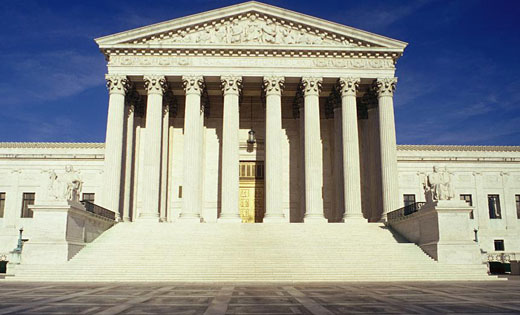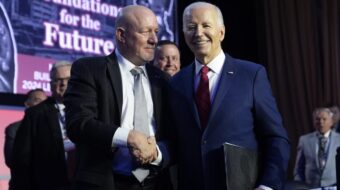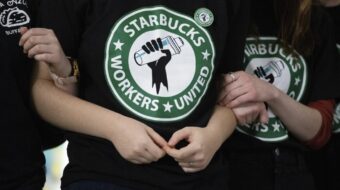
WASHINGTON – A right-wing attempt to judicially outlaw card-check recognition, company neutrality during union organizing drives, and even the right to worksite access if the firm agrees to it, ran into an apparently skeptical U.S. Supreme Court on Nov. 13.
The case, brought by anti-union worker Martin Mulhall ,but backed and funded by the anti-worker National Right to Work Legal Defense Foundation, pitted Unite Here Local 355 against workers who – they claimed – objected to Hialeah Race Track’s agreement to those conditions during the union’s organizing drive there. In return, the union joined the track in campaigning for a pro-casino referendum in Florida.
But the case stretches beyond one race track and one casino in Florida, Unite Here General Counsel Richard McCracken told reporters after the hour-long hearing before the High Court.
That’s because the federal appeals court in Atlanta, siding with Mulhall and the Right to Work group, had ruled that granting card check, neutrality and worksite access to the union were “things of value” to Local 355 – and to all unions – and labor law bars firms from giving unions “things of value.” Doing so, the law says, is criminal.
That part of the National Labor Relations Act “is a criminal statute” and a potential precursor to racketeering charges that could be leveled against unions during organizing drives if the justices side with Mulhall and the “Right to Work (for less)” group, McCracken explained after the High Court session.
Other federal courts, and the National Labor Relations Board (NLRB), have ruled for decades that card check, access and neutrality are not “things of value” to the union, and thus legal. The Right to Work group’s attorney, William Messenger, argued that card check, neutrality and access aren’t, drawing skeptical questions from the justices.
“There are some things that I think have value, even though they may not have market value,” Justice Sonia Sotomayor commented. “For example, bribing a union steward by offering him a favorable work schedule.”
“Congress did not intend these three things to be read as ‘things of value,'” and thus illegal for companies to give unions under labor law, McCracken told the justices. “Agreements by parties to set the ground rules for an organizing campaign are not things of value,” he added.
“Reading the policies of the (National Labor Relations) act as a whole, voluntary recognition “of a union by a company “is not only permissible, but preferred,” McCracken then told Justice Stephen Breyer. “The three procedures here are only useful under voluntary recognition,” he added.
“And the agreement here doesn’t recognize the union,” he said later.
Chief Justice John Roberts strayed beyond card check itself, trying to get attorneys to say that card check coerces workers, a favorite right wing claim. Justice Department attorney Michael Breeden, speaking for the NLRB and the Obama administration and siding with the union, rejected that – as well as Roberts’ argument that card-check is more coercive than an NLRB-run election.
“If a majority of the workforce wants to be organized and represented by that union, the argument here, as I understand it, is that this agreement taints that process by allowing the card check procedure that it has been argued exercises coercion against employees to support the union,” Roberts said.
“Well, this court in the Gissel Packing case many years ago rejected that argument,” Dreeben replied, citing a case that occurs in virtually every NLRB ruling. “The contention that “card check agreements are inherently coercive has been rejected” both by other circuit courts and the NLRB itself, he noted.
“Will you concede that they’re more coercive than a secret ballot?” Roberts shot back about card check. “I don’t think they’re coercive at all inherently,” Dreeben replied.
“The organizer comes up to you and says, ‘Well, here’s a card. You can check ‘I want to join the union,’ or two, ‘I don’t want a union,'” Roberts said. “Which will it be?’ And there’s a bunch of your fellow workers gathered around as you fill out the card.
“Some would argue that employers also have big guys and it’s very coercive to have your employer in there on the factory floor reminding employees daily that they’re very anti-union and that there are a lot of costs to joining a union,” Dreeben replied.
“The process is one in which” the union and the company can go to the NLRB for an election. “But this court in Gissel Packing, backed up by decades of board law, has validated that card check agreements are perfectly legitimate and may facilitate the employees’ free exercise of their choice to have a union.”
“The government’s position is that the three terms that are at issue -‘neutrality,’ ‘access,’ and ’employee list’ — are not prohibited Breeden said. “Probably the best way to reach that conclusion is to determine that Congress did not intend that these three things be viewed as things of value under the statute.”
Photo: CC

MOST POPULAR TODAY

‘Warning! This product supports genocide’: Michigan group aims to educate consumers

“Trail of Tears Walk” commemorates Native Americans’ forced removal

After months of denial, U.S. admits to running Ukraine biolabs

Ohio: Franklin County treasurer attends Netanyahu meeting, steps up Israel Bond purchases

Hold the communism, please: SFMOMA’s Diego Rivera exhibit downplays artist’s radical politics






Comments